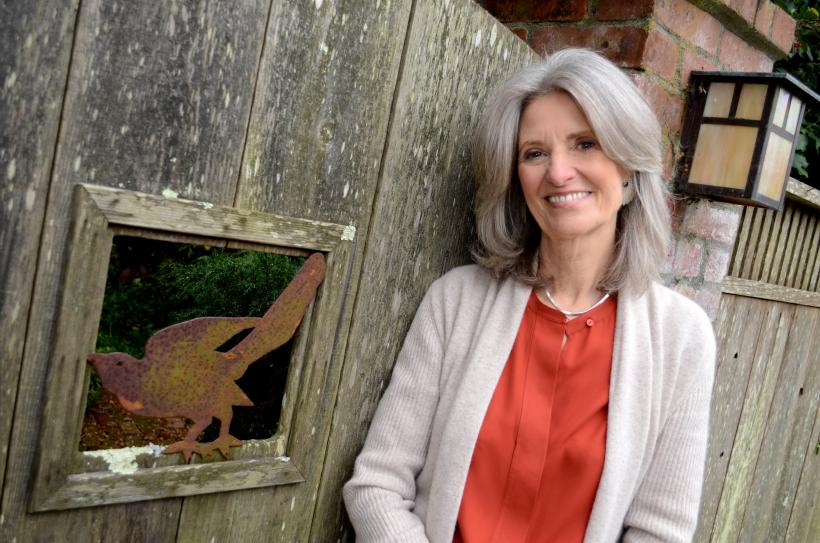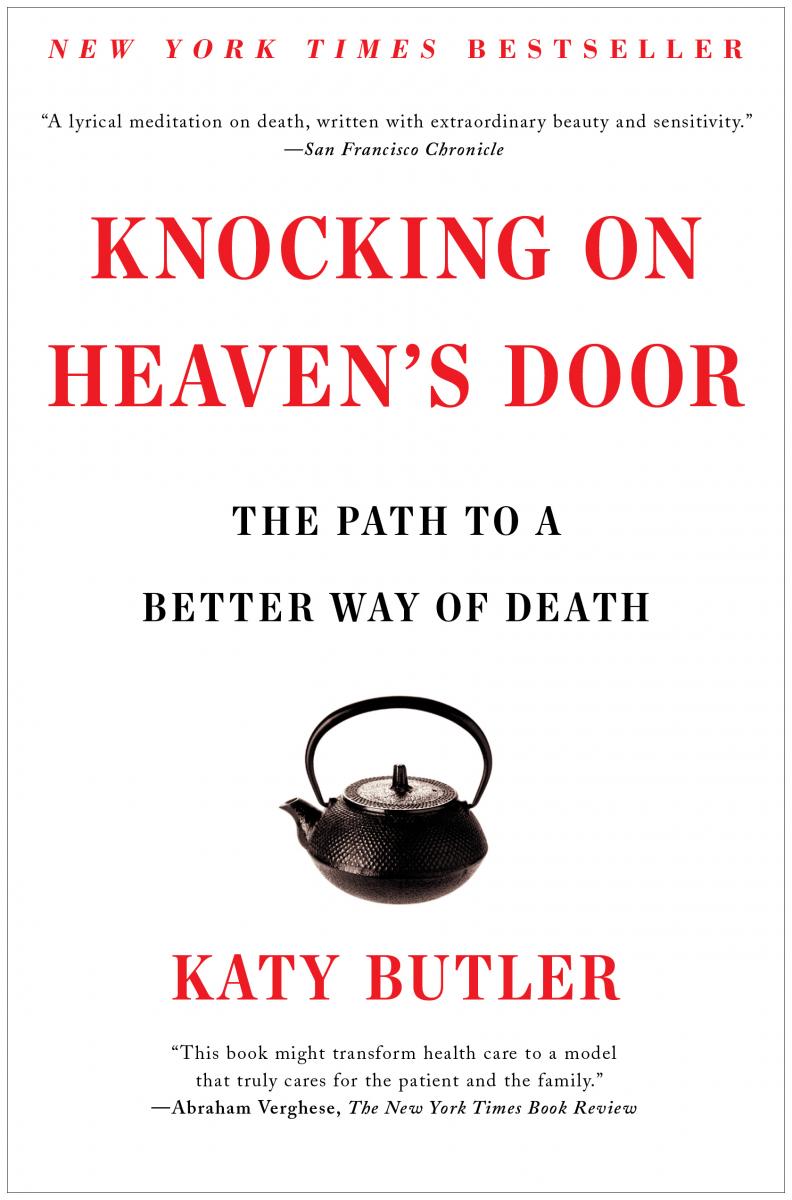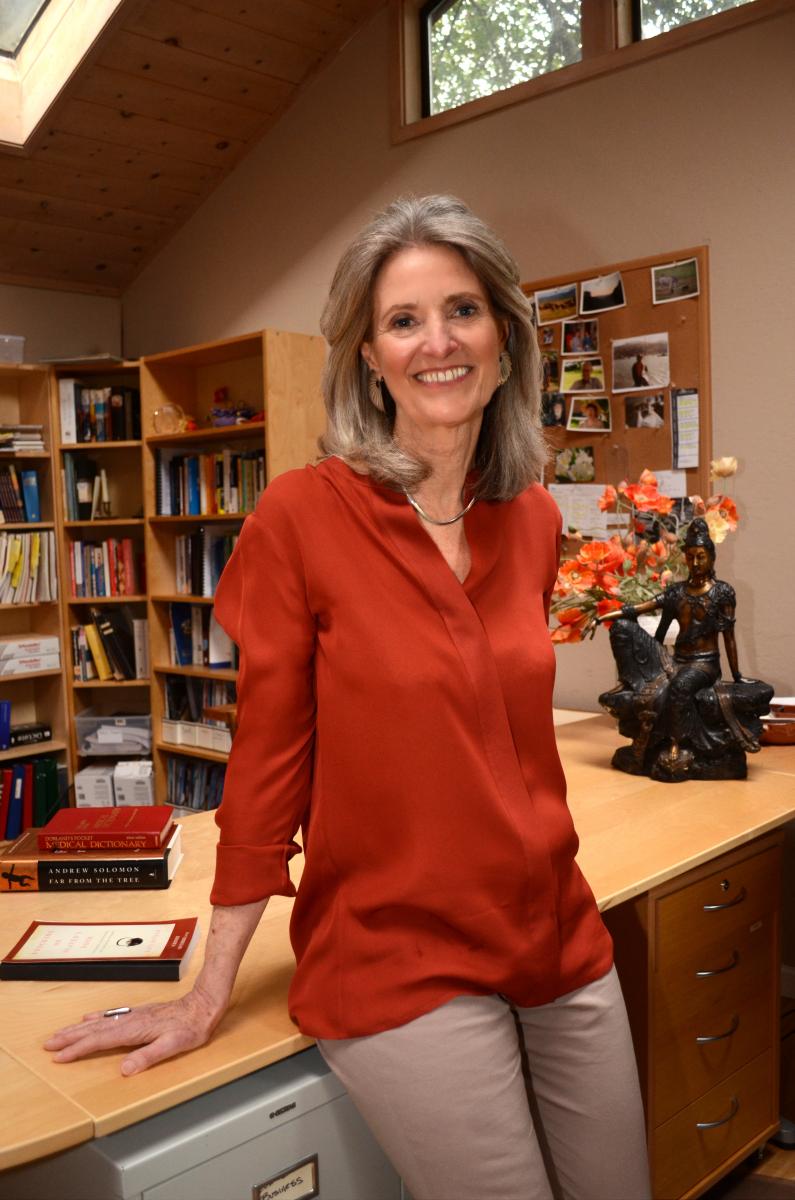
After years spent caring for her ailing father and subsequently her mother, both of whom passed away, Katy Butler became invested in a topic many find too controversial or personally painful to address: end-of-life care for loved ones.
The experience of caretaking for her father was fraught with frustration, the result of working with a medical system that refused to disable the pacemaker, which enabled his heart to outlive his stroke and dementia. Butler and her mother were left caring for a man who was no longer the person they knew and loved. Her personal ordeal led her to question the very nature of modern medicine, and the ways in which it seeks to preserve life at the expense, at times, of a humane and timely death.
After her New York Times Magazine cover story, "What Broke My Father's Heart," deeply resonated with others who expressed and experienced similar frustrations, Butler turned the story into a book- Knocking on Heaven's Door: The Path To A Better Way Of Death-a bestselling blend of poignant memoir and sharp investigative reporting. It was named a notable book of 2013 by The New York Times and "One of the 10 best memoirs of 2013" by Publisher's Weekly
A longtime and award-winning writer whose work has been featured in Best American Essays, Best American Science Writing, The New Yorker and Best Buddhist Writing, Butler became a leading voice in a growing movement to address an issue that's long stayed in the closet.
We chatted with Butler about her experience writing the book, why modern medicine is flawed, and the unlikely allies she's found in her fight for a better path to ending life.
In what ways is the current end-of-life-care system flawed? And why is it so difficult for people to address these issues?
There's been an unexamined cultural assumption that if you love people, you want to keep them alive as long as possible. So anyone who asks questions about allowing a natural death has been framed as unloving. It's taken time to develop a common language that frames things in a different way.
When Brittany Maynard, the woman who recently took her own life, was discussed on The View, one of the women said she was surprised this issue-of people feeling dis-empowered and getting inappropriate medical treatment at the end of life-hasn't come out of the closet before. That situation is helping to bring it out of the closet.
When I said I wanted to get my father's pacemaker turned off, I was guilt-tripped a lot by friends, and had a very good friend tell me that was akin to euthanasia. When I wrote the article and book, I thought my mother and I were outliers, and that I was saying something outrageous. That feels less and less true now. It was very clear from the responses that my mom and I aren't outliers. I'm for compassion at the end of life, and against cruelty. Another new book, Being Mortal, is a very different book from mine, but flat-out admits that medicine has made a total mess of the end of life.
I'm sure we're not through yet on breaking this issue open as a culture. But I feel like I threw a really good stone, and it's still happening. I'm still getting asked to speak a lot, inside and outside medicine. The biggest surprise was the amount of distress within medicine there is about this, and the number of doctors who are concerned and trying to open up the conversation. That was the hugest surprise for me-a beneficial surprise.
What are some of the most poignant responses you've received?
There's a Facebook group called Slow Medicine with over 1,000 members that's just completely grown organically. Partly as a result of that, and partly from people emailing me, I've heard hundreds of stories now about bad deaths or difficult deaths.
One woman from the South, an RN and devout Christian, described how her father had a do-not-resuscitate order and at the end of his life in the hospital, his wife, the RN's mother, panicked. She started insisting that everything be done, as he was in the process of dying. Often doctors willoverride a do-not-resuscitate order if there's panic or disagreement among family members
The woman prayed all the way to the hospital for God to give her the right words to say to her mom. And when she got there, she took her mother's hand and said, "Mom, dad has been in the hospital several times this year, and every time God has allowed you to take him home. Now God wants to take him home." That completely touches me because it's not the language I would've used with my parents, but it shows that if you're spiritually attuned and ask for help from the universe, you can talk to people in terms that make sense to them spiritually and emotionally.
I've heard stories of people gathering their courage and speaking their truth, saying no to the hospital, no to the procedure, out of love, and succeeding. It's not a futile task. If you do get in touch with courage, love and wisdom, chances are you'll be able to have things come out all right. People are in fear, including doctors and other family members; doctors are afraid they'll be sued for letting someone die, and family members are afraid they're not being loving. But if you can become fearless through love, you have an excellent chance at healing.
What are some of the most critical or difficult responses you've received? 
The toughest messages, and there haven't been as many as the others, came from people saying that if I had taken better care of my parents, they wouldn't have suffered or died. And from cardiologists saying that I don't understand how pacemakers work.
For a lot of people, pacemakers can be a good thing. It's complicated, but in essence, they sometimes prolong life and sometimes don't; they sometimes improve quality of life, and sometimes don't.
None of that takes away from the fact that my mom and I and dad should've been fully informed of the choices.
You've talked about the "relentless pursuit of maximum longevity." What do you mean by that?
For thousands of years, medicine has been concerned with trying to extend life and avoid premature death. And unfortunately, that process never got an end point, So now, even though we've pretty much abolished premature death, we're also trying to abolish death in any form. The idea of an appropriate or timely death has gone out the window.
The development of drugs for cancers has been extremely profitable, as have devices such as defibrillators that have even a small chance of prolonging life. From the point of view of the medical device and pharmaceutical industry, it's not necessarily about what's best for patients, but about expanding markets. Those industries arecapitalist corporations operating within a capitalist system, trying to expand profits within the limits of their own ethics. They're the most powerful players on the game board. We've essentially deferred decisions to a juggernaut of money-making and expanding markets. It's not really their job to share our medical ethics, or to shape how Medicare reimburses. But because of the strength of their lobbies in Washington, they have enormous influence.
They influence doctors and have a sales force army. So they have silently shaped medical decision making, and we need to grab back that control, because it's helping to create horrifically suffering-filled processes of dying.
How can we develop a new language to change things?
We need a grassroots movement of the gravely ill and dying and caregivers to reshape how we reimburse medicine. The fact is, fee-for-service medicine doesn't reward doctors for taking time or being honest; it rewards them for throwing tests and technology at patients. The more they do that, the better they're paid. They get the impression that's what society wants them to do.
The Lown Institute has been active in creating a grassroots movement toward humane medicine. There's the Slow Medicine Facebook group. There are bills in Congress designed to improve payments for palliative care, the newest of medical specialties focused on quality of life and not pretending we're not going to die. One of the bills in Congress is by Ron Wyden from Oregon, proposing $250 million from pilot programs to pay palliative doctors better.
The article and book strike a delicate balance between the personal and journalistic. How did you navigate both of these elements?
It was very painful in some ways to write the family story. I cried. I still feel terrible that I didn't take better care of my mother in her last year. I did better with my dad, but I think I got burned out and wasn't there for her. I suffered and continue to suffer because of that. But I've also achieved healing by writing the book. I had to pull out positive strands from the story: how much I loved my parents, how I became more of a grown-up and learned how to give to them.
It was healing and helped me relive my love for them, and their love for me. To forgive myself, forgive them, and concentrate more on the love than suffering. This continues to be quite healing. I speak a lot now, at medical conferences and grand rounds, lectures at medical schools. I have a PowerPoint presentation that is half photos of my family and have medical research, so there's a positive way that I get to keep their memory alive and our love for each other alive.
As for the writing process, I wrote three drafts of the book, and it was a matter of making the book not boring to the best of my ability. It was illuminating to realize that my father had been limited to $1,500 a year for speech therapy, but Medicare was willing to pay $12,000 for a pacemaker. It was illuminating to understand better why the system doesn't operate well. It was less about blaming and more about gaining a broader understanding of the forces at play against every caregiver from doing the right thing.
I just sort of zig-zagged between the personal and journalistic; when I got too heartbroken and heart soggy, then I'd take a break and write about the history of the pacemaker. This gave me a lot of respect for the ingenuity of people who invented these devices. So it was a matter of thinking: When is the reader going to get too bogged down thinking of my father's decline, and need a break for some investigative reporting, like the terrible influence of money from cardiologists to fund the medical industry.
I was mindful of the limits of the readers; readers can't take undiluted tragedy. There have to be upbeat moments and some sense of triumph. There has to be a way to channel reader outrage to understand the big picture.
I have read on Amazon that some people just want to read the memoir. But if I had another rewrite, I would've cut the family story by 10%.
You're a highly regarded science writer. What has your experience been as a woman in this field?
 I got my chops by writing about psychology for a very good psychotherapy publication. I had a male boss, and all the writers were female. I felt he totally respected my intelligence, and I was writing for a very intelligent audience.
I got my chops by writing about psychology for a very good psychotherapy publication. I had a male boss, and all the writers were female. I felt he totally respected my intelligence, and I was writing for a very intelligent audience.
I came to science writing fairly late in my career. I had a great deal of intellectual confidence by then, and the capacity to think critically, to read studies and look at stats. I had a lot of self-confidence by the time I tackled science writing. I just had a romp and it was fun.
Because I'm a woman and because I spent twelve years as a general assignment reporter on a big newspaper (The San Francisco Chronicle), a, I always had an eye on how to translate things for intelligent, thoughtful, but not very informed readers. Perhaps women have some advantage; I was never impressed by jargon or trying to make myself sound intelligent . I believe people of intelligence can translate even the most wonky policy or technical biochemistry into simplicity; it is translatable if the writer truly understands it. It's a mark of lower intelligence if you start sticking huge chunks of undigested DNA material into your essay.
Maybe those cardiologist responses could classify as sexist, but they don't bother me.
You're a devout Buddhist, but also turned a critical lens on the community in the '80s by exposing abuses of power and sexuality among the community's leadership. What does Buddhism mean to you -and what was it like challenging a community you love?
I was drawn to Buddhism because I was suffering. I was in my late '20s, not married and hadn't had much success in maintaining long-term good emotional relationships with men. I was working at the Chronicle and was lonely; I felt my deep sense of altruism was not getting to express itself well. I just went camping with a friend in the mountains outside Carmel [California], and we just-almost on a lark-went to hot springs that were part of a Zen monastery in the wilderness. I got to meditate for the first time, and it was a life-changing experience. It really did help me with my suffering. The first tenet of Buddhism is that there's a great deal of suffering in life, and it comes from an inability to accept things as they are. It's the practice of learning to accept things as they are.
This had influence on my book; the failure to accept death on death's terms is amplifying suffering at the end of life. Buddhism gave me a habitual way of responding to suffering that has worked to my benefit. If you're suffering, miserable or mad, examine your assumptions.
As for the story I wrote about abuses within my own Buddhist community it's kind of ironic, because although it was very painful for other people involved in my community who felt exposed, it, was part of a process of truly finding my voice as a writer, journalist and truth-teller. AAt the same time, it was devastating, because I essentially had to leave this community I was a part of, because people were so upset. But on the other hand, it strengthened my spine, and gave me the ability to think fearlessly and critically. It was painful and very necessary in the long run.
What's next for you?
I'm about to embark on my second book about the end of life-a how-to with 100 simple steps to a good end of life. It's a book for people who are approaching or already in the crisis, and is extremely simple and concise, written like a haiku.
I'm going to be part of an op-ed panel for The New York Times in January, talking about end-of-life care. I've also been doing a lot of public speaking, but am having to wind it down. Being a writer and being a public speaker are very different things. I'm basically introspective and easily distracted; when I write, I have to be a hermit. I'm actively weighing now how much further I can go with speaking.
I don't think we're ever going make end of care a painless process, but I do think there's going to be a meaningful conversation, and we can move closer to what people envision for themselves.
Photos by Cristina Taccone

